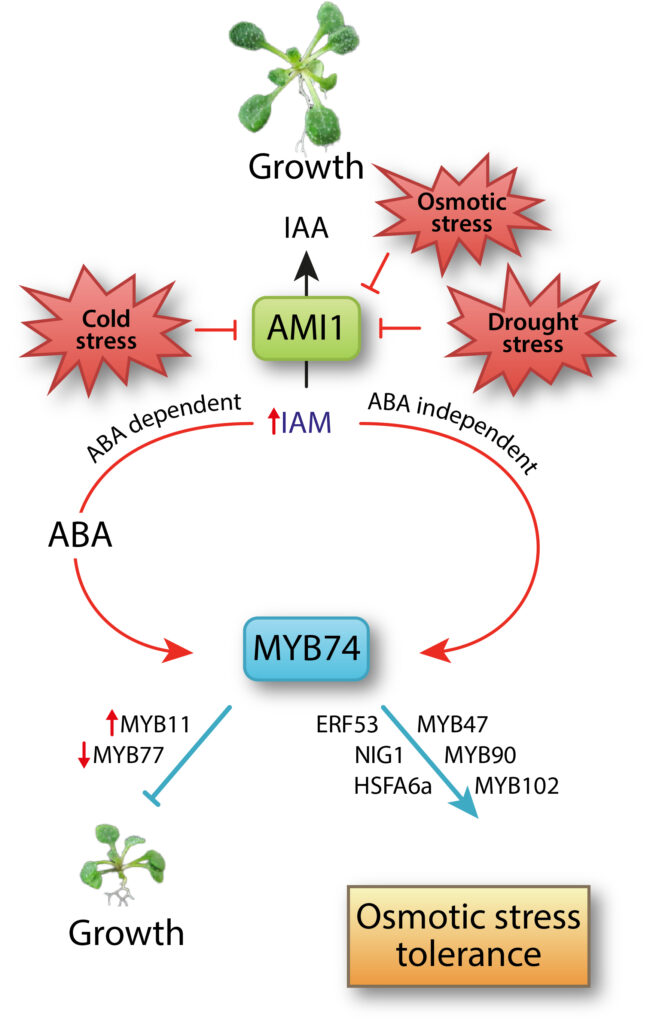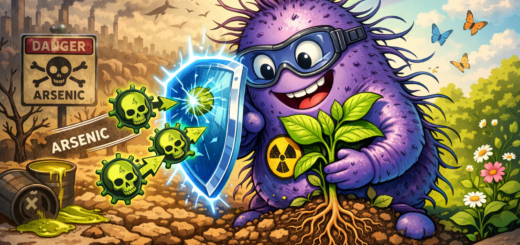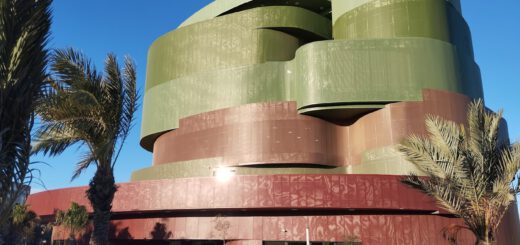MYB74 in the media
Finally, we put a gene ID to the acronym LAUCH1
So glad that we made the right educated guess when we decided to have a closer look at MYB74 a couple of years ago. So happy for Paloma to conclude her PhD with such a nice paper. It was a pleasure to see her dedication and commitment over the past years, pushing the work on this project forward. However, it has been a great team effort and, thus, the merits go to everybody who contributed to this piece of work. THANKS A LOT TO EVERYONE INVOLVED!!!
Ortiz-García, P. et al. 2022 Frontiers in Plant Science
Synopsis:
The accumulation of the auxin precursor indole-3-acetamide (IAM) in the ami1 mutant has recently been reported to reduce plant growth and to trigger abiotic stress responses in Arabidopsis thaliana. The observed response includes the induction of abscisic acid (ABA) biosynthesis through the promotion of NCED3 expression. The mechanism by which plant growth is limited, however, remained largely unclear. Here, we investigated the transcriptional responses evoked by the exogenous application of IAM using comprehensive RNA-sequencing (RNA-seq) and reverse genetics approaches. The RNA-seq results highlighted the induction of a small number of genes, including the R2R3 MYB transcription factor genes MYB74 and MYB102. The two MYB factors are known to respond to various stress cues and to ABA. Consistent with a role as negative plant growth regulator, conditional MYB74 overexpressor lines showed a considerable growth reduction. RNA-seq analysis of MYB74 mutants indicated an association of MYB74 with responses to osmotic stress, water deprivation, and seed development, which further linked MYB74 with the observed ami1 osmotic stress and seed phenotype. Collectively, our findings point toward a role for MYB74 in plant growth control and in responses to abiotic stress stimuli.

Figure. A model summarising the IAM accumulation-mediated transcriptional activation of MYB74. Abiotic stresses, including osmotic stress, suppress the expression of AMI1 (Perera et al., 2008; Lehmann et al., 2010), which translates into an accumulation of IAM. The auxin precursor IAM triggers ABA biosynthesis (Pérez-Alonso et al., 2021). Here, we demonstrated an ABA dependent and an ABA independent transcriptional activation of abiotic stress-related TF MYB74. IAM directly induces the expression of MYB74. The IAM-mediated accumulation of MYB74 results in the transcriptional reprogramming of many osmotic stress-related genes, including further MYB factors, such as the dehydration stress memory gene MYB47 (Ding et al., 2013) and the abiotic stress-related genes MYB90 and MYB102 (Denekamp and Smeekens, 2003; Li et al., 2018a), the ethylene response factor ERF53 (Hsieh et al., 2013), the basic helix-loop-helix factor NIG1 (Kim and Kim, 2006), and the ABA-responsive heat shock response factor HSFA6a (Hwang et al., 2014). Consequently, MYB74 is assumed to integrate ABA dependent and independent signals and to be involved in plant responses to osmotic stress. At the time, the accumulation of MYB74 suppresses plant growth considerably, possibly through the transcriptional activation of MYB11, which is known to be capable of delaying plant development (Petroni et al., 2008), and the repression of MYB77 expression. MYB77 is involved in the modulation of auxin signal transduction and the control of lateral root formation (Shin et al., 2007).


